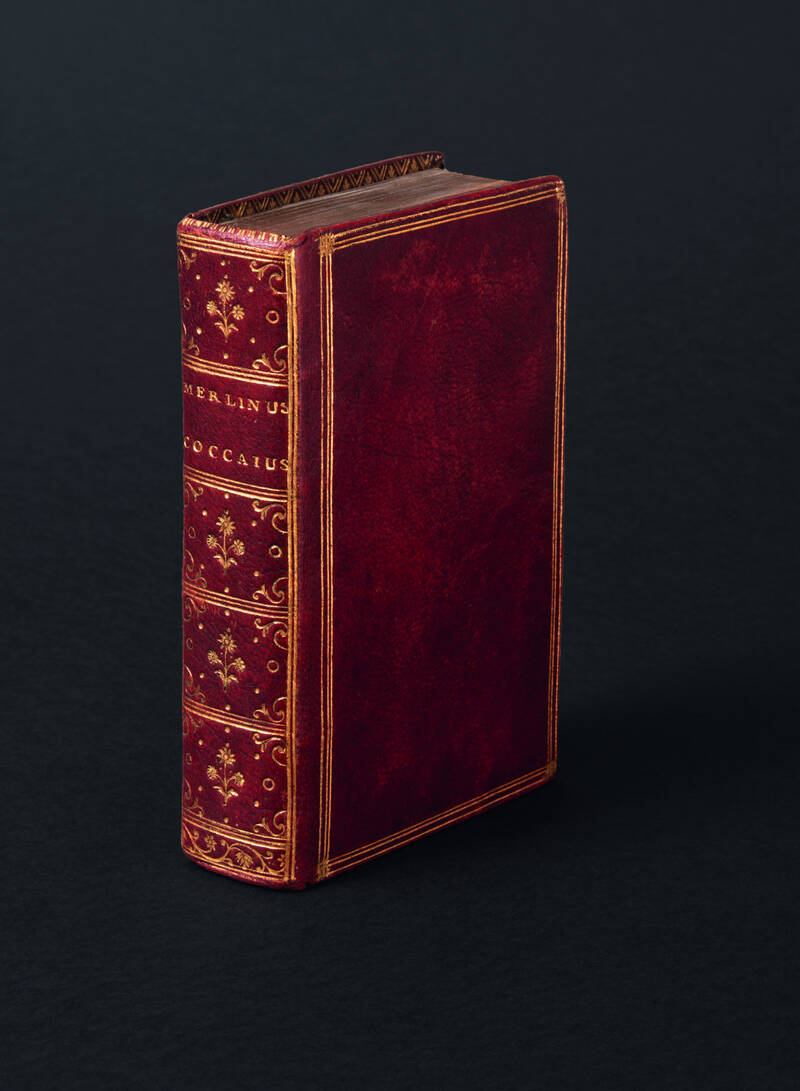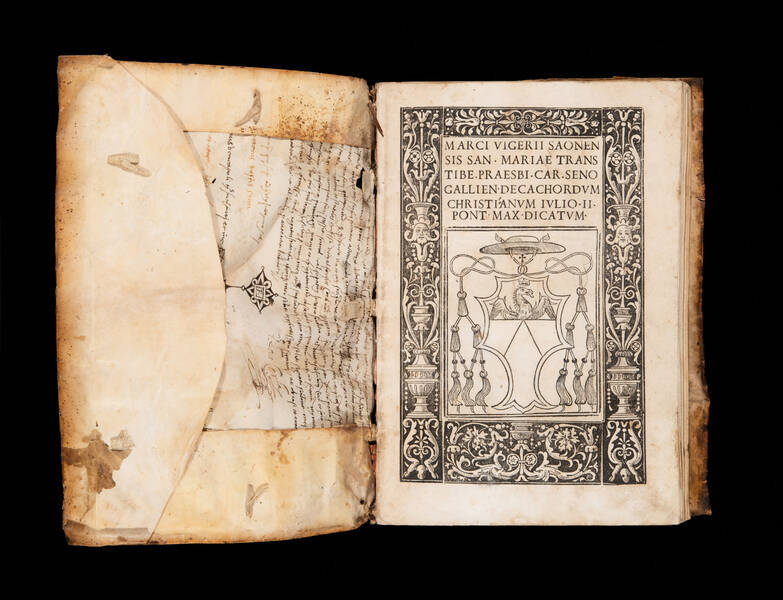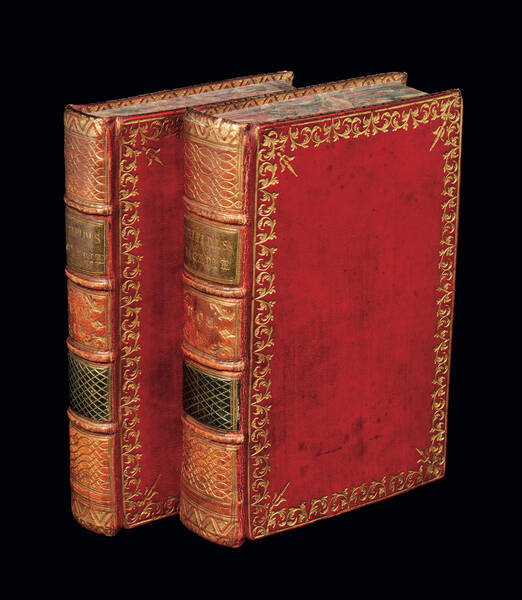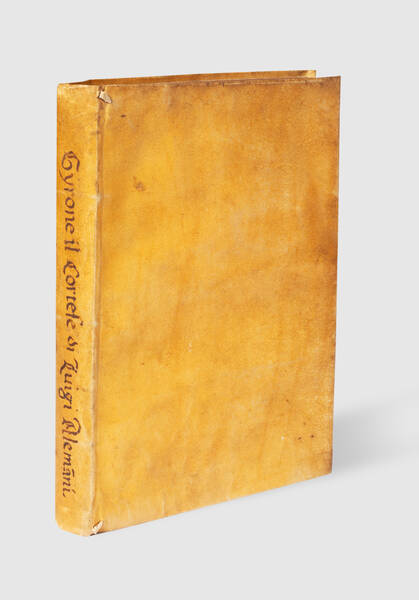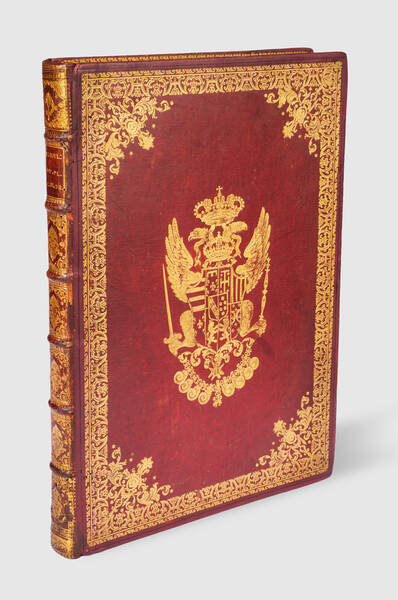FOLENGO, Teofilo. Opus Merlini Cocaii poetae Mantuani Macaronicorum, totum in pristinam formam per me magistrum Acquarium Lodolam optime redactum in his infra notatis titulis diuisum. Zanitonella, quae de amore Tonelli erga Zaninam tractat. Quae constat ex tredecim sonolegijs, septem ecclogis, & vna strambottolegia. Phantasiae Macaronicon, diuisum in vigintiquinque Macaronicis, tractans de gestis magnanimi, & prudentissimi Baldi. Moschaeae facetus liber in tribus partibus diuisus, & tractans de cruento certamine muscarum & formicarum. Libellus epistolarum & epigrammatum, ad varias personas directarum.
Toscolano, Alessandro Paganino., 5 January 1521.16° (118 x 70 mm.), 272, [8] leaves; with 54 full - page woodcut illustrations in text. Collation: A-Z8 , AA-MM8, Italic, Gothic and Roman types. A very good copy in late eighteenth century French red morocco binding, covers framed with triple gilt filets, spine in compartments richly gilt with gilt title.
First complete edition and the first to be illustrated. The book contains along with the definitive verion of the Baldus, the Zanitonella, the Moscheide and the Libellus epistolarum et epigrammatum. Teofilo Folengo, better known by his pseudonym Merlin Coccai was, without doubt, the best and most famous representative of the macaronic literature. Born in 1491 in Mantua, “at the age of sixteen he entered the monastery of Sant' Eufemia near Brescia, and eighteen months afterwards he became a professed member of the Benedictine order. For a few years his life as a monk seems to have been tolerably regular, and he is said to have produced a considerable quantity of Latin verse, written, not unsuccessfully, in the Virgilian style. About the year 1516 he forsook the monastic life for the society of a well-born young woman named Girolama Dieda, with whom he wandered about the country for several years, often suffering great poverty, having no other means of support than his talent for versification'. […] Then repenting of the step taken, he made overtures to his order for his readmission, which was granted in 1534, only after he had done penance and had cleared himself of certain suspicions of heterodoxy . ‘Some of his later years were spent in Sicily under the patronage of Don Fernando de Gonzaga, the viceroy; he even appears for a short time to have had charge of a monastery there. In 1543 he retired to Santa Croce de Campesio, near Bassano; and there he died on the 9th of December 1544.' (Encyclopaedia Britannica) “Folengo's fame rests chiefly on his Baldus which was first printed in 1517 on seventeen books or Macaronicae, and was reprinted in 1521 with eight additional books. The work, epic in its tendencies, belongs to the category of burlesque compositions in macaronic verse (that is in a jargon, made up of Latin words mingled with Italian words, given a Latin aspect), which had already been inaugurated by Tifi Odasi in his Macaronea, and which, in a measure, marks a continuance of the goliardic traditions of the Middle Ages. For the first edition of the Baldus, Folengo had derived burlesque traits and types of personages from the chivalrous romances of Boiardo and Pulci. His second edition reveals, in the greater amplitude of its action, in the improved manner of setting forth comic types, and in its generally better developed feeling for art, the author's reading of Ariosto's Orlando Furioso.
However, the poem is a parody not only of the Italian chivalrous romance but also of the Virgilian epic, and, in its latter part, of Dante's Divine Comedy as well. Furthermore, it is grossly satirical in its treatment of the clergy and at times borders on the sacrilegious. In view of the general nature of the work, it is easily intelligible that it should have appealed to Rabelais, who found in it the prototype of his Panurge and his Gargantua. Among the lesser works of Folengo are the Zanitonella, which parodies both the Virgilian pastoral and the Petrarchian love-lyric; the Orlandino (1526), which gives in Italian octaves a burlesque account of the birth and youth of Roland; the curious Caos del Tri per uno (1527), which in verse and prose and in mingled Latin, Italian, and Macaronic speech, sets forth allegorically the author's own previous heretical leanings and finally states his confession of faith and the Moschaea, which in three books of Macaronic distichs relates, somewhat after the fashion of the Batrachiomachia as well as of the chivalrous romances, the victory of the ants over the flies, and preludes the Italian mock-heroic poem of the seventeenth century. After his return to his order, Folengo wrote only religious works, such as the Latin poem Janus, wherein he expresses his repentance for having written his earlier venturesome compositions, the Palermitana, in Italian terza rima; and the Hagiomachia, which, in Latin hexameters, describes especially the lives of eighteen saints.” (Catholic encyclopedia)
Adams F-687; Brunet, II: 1317; Sander 2832.
Other Books
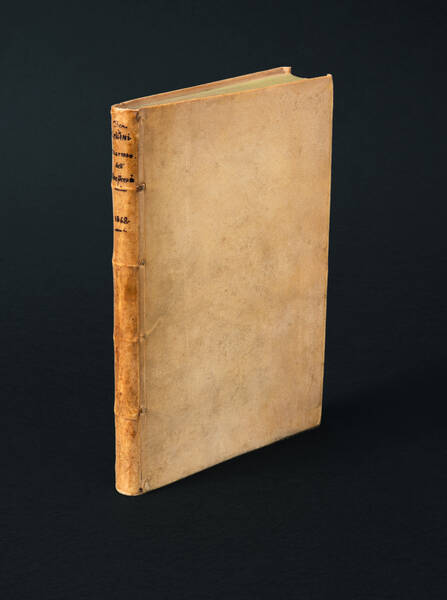
CELLINI, Benvenuto
Due trattati vno intorno alle otto principali arti dell'oreficeria. L'altro in materia dell'arte della scultura; doue si veggono infiniti segreti nel...
€ 12.000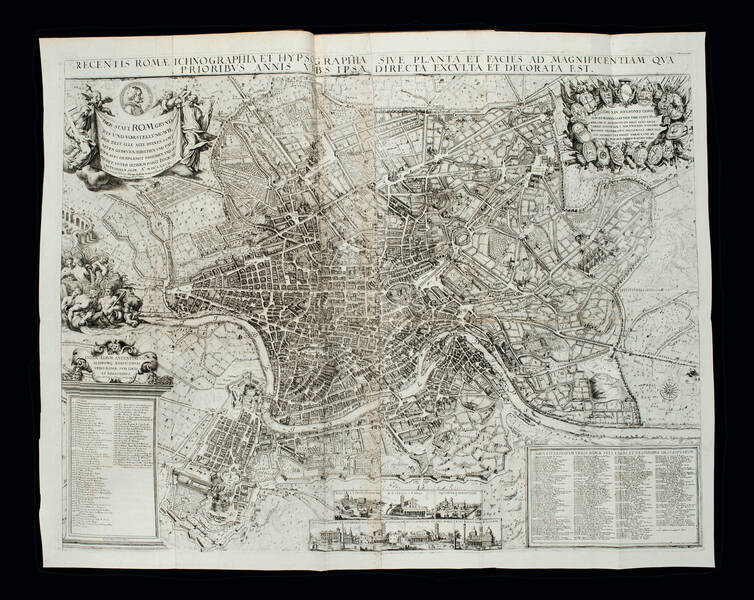
SANDRART, Joachim von
Romae antiquæ et novæ theatrum; sive, genuina ac vera urbis, juxta varios ejusdem status, delineatio topographica.
SOLD OUT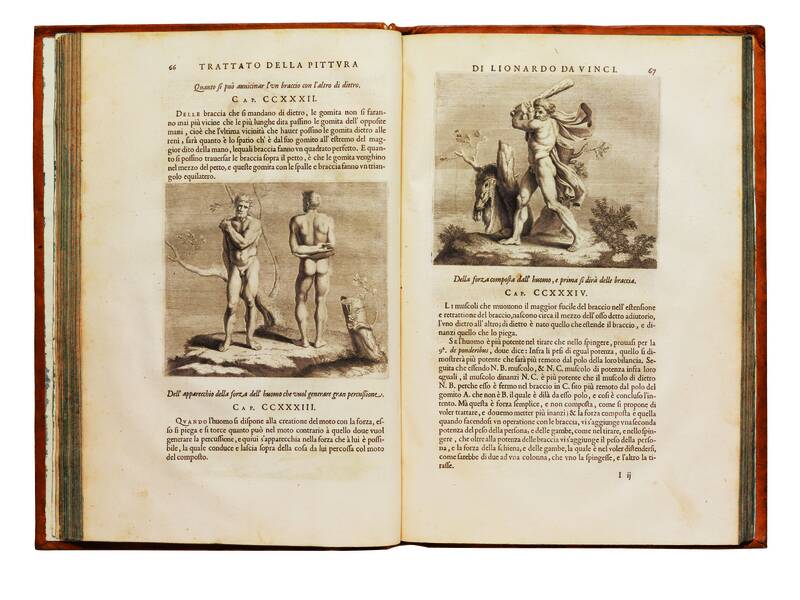
LEONARDO DA VINCI
Trattato della Pittura di Lionardo da Vinci, Nouamente dato in luce, con la vita dell’istesso autore, scritta da Rafaelle Du Fresne. Si sono giunti i...
SOLD OUT![[The Commentaries.] C. Julii Cæsaris Quae Extant. Accuratissimè cum Libris Editis & MSS optimis Collata, Recognita & Correcta. Accesserunt Annotationes Samuelis Clarke. S.T.P. Item Indices Locorum, Rerumque & Verborum Utilissimæ. Tabulis Æneis Ornata. [The Commentaries.] C. Julii Cæsaris Quae Extant. Accuratissimè cum Libris Editis & MSS optimis Collata, Recognita & Correcta. Accesserunt Annotationes Samuelis Clarke. S.T.P. Item Indices Locorum, Rerumque & Verborum Utilissimæ. Tabulis Æneis Ornata.](https://www.medariquier.com/typo3temp/pics/e0a4828aa4.jpeg)
CAESAR, Gaius Julius
[The Commentaries.] C. Julii Cæsaris Quae Extant. Accuratissimè cum Libris Editis & MSS optimis Collata, Recognita & Correcta. Accesserunt...
€ 20.000![La zucca del Doni. [Fiori della zucca del Doni; Foglie della zucca del Doni; Frutti della zucca del Doni.] La zucca del Doni. [Fiori della zucca del Doni; Foglie della zucca del Doni; Frutti della zucca del Doni.]](https://www.medariquier.com/typo3temp/pics/efd2a7667b.jpg)
DONI, Anton Francesco
La zucca del Doni. [Fiori della zucca del Doni; Foglie della zucca del Doni; Frutti della zucca del Doni.]
€ 7.000![[De Architectura libri decem], M. Vitruuius per Iocundum solito castigatior factus cum figuris et tabula vt iam legi et intelligi possit. [De Architectura libri decem], M. Vitruuius per Iocundum solito castigatior factus cum figuris et tabula vt iam legi et intelligi possit.](https://www.medariquier.com/typo3temp/pics/b57e48f107.jpg)
VITRUVIUS POLLIO, Marcus
[De Architectura libri decem], M. Vitruuius per Iocundum solito castigatior factus cum figuris et tabula vt iam legi et intelligi possit.
SOLD OUT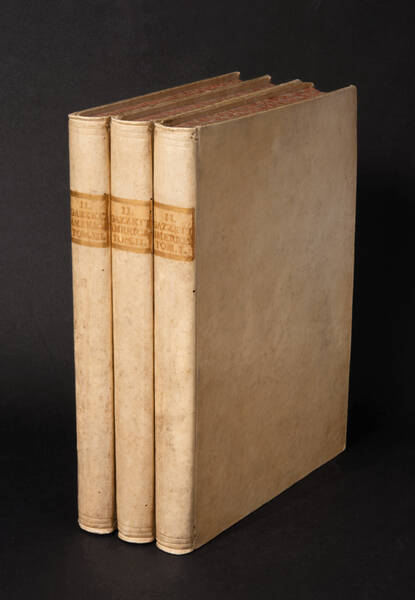
GAZZETTIERE AMERICANO
Il Gazzettiere Americano, contenente un distinto Ragguaglio di Tutte le Parti del Nuovo Mondo.
SOLD OUT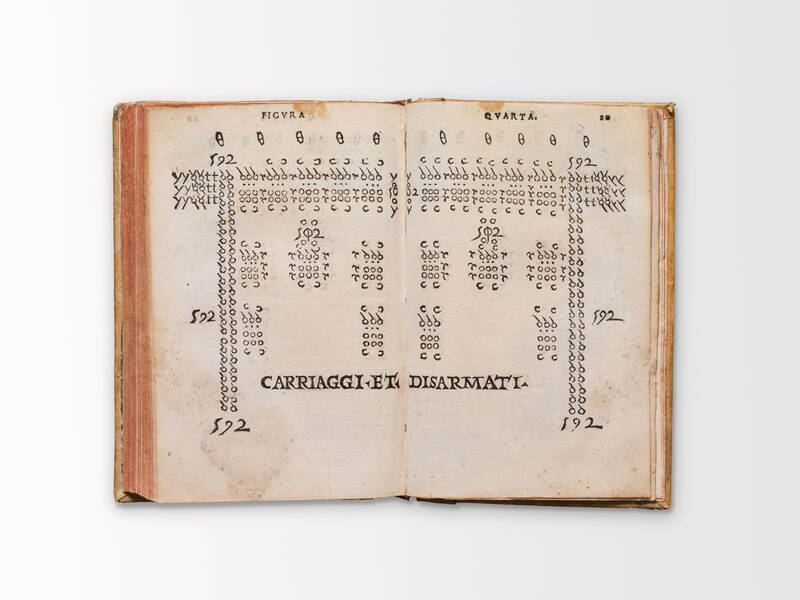
MACHIAVELLI, Niccolò
Libro della Arte della guerra di Niccolò Machiavegli cittadino et segretario fiorentino.
SOLD OUT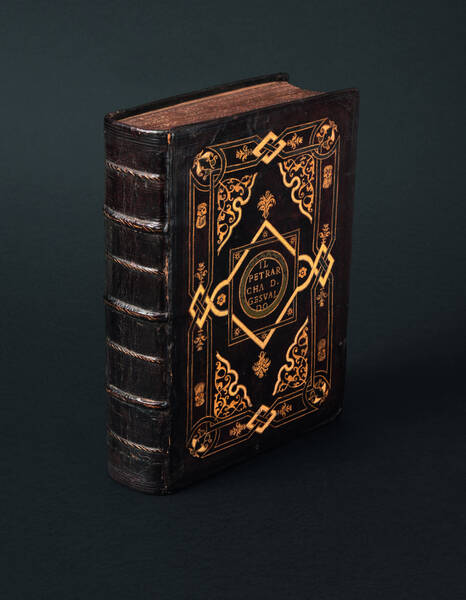
PETRARCA, Francesco
Il Petrarcha colla spositione di misser Giouanni Andrea Gesualdo. I Triomphi del Petrarcha colla spositione di misser Giouanni Andrea Gesualdo da...
SOLD OUT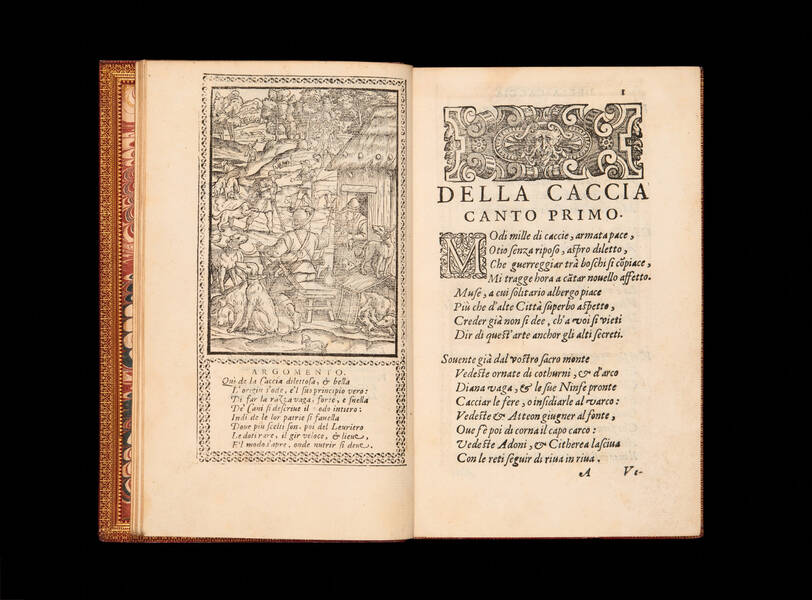
VALVASONE, Erasmo da
Della caccia poema del signor Erasmo di Valuasone. All'ill. signor Cesare di Valuasone suo nepote. Con gli argomenti a ciascun canto del sig. Gio....
€ 3.500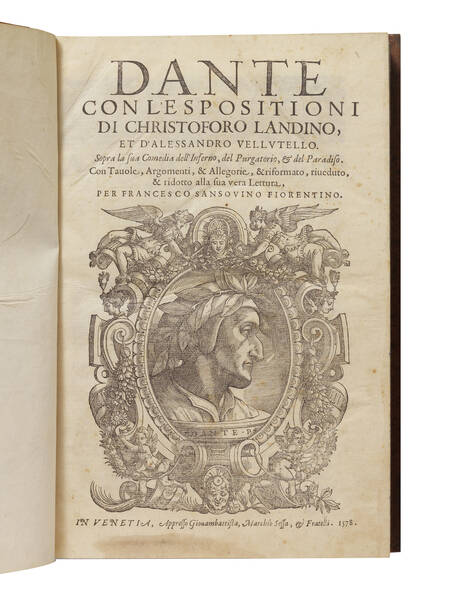
ALIGHIERI, Dante
Dante con l’espositioni di Christoforo Landino, et d’Alessandro Vellutello. Sopra la sua Comedia dell’Inferno, del Purgatorio, & del Paradiso. Con...
SOLD OUT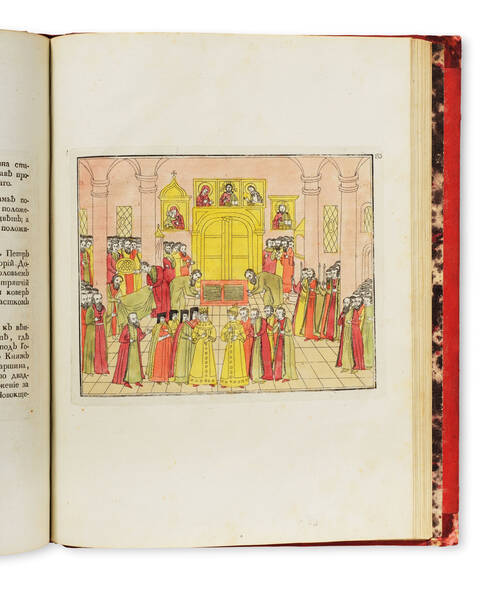
BEKETOV, Platon
Opisanie v litsakh torzhestva, proiskhodivshego v 1626 godu fevralia 5, pri brakosochetanii gosudaria tsaria i velikogo kniazia Mikhaila...
€ 18.000MEDA RIQUIER rare books ltd.
4 Bury Street St James's
SW1Y 6AB London
Phone +44 (0) 7770457377
info@medariquier.com
